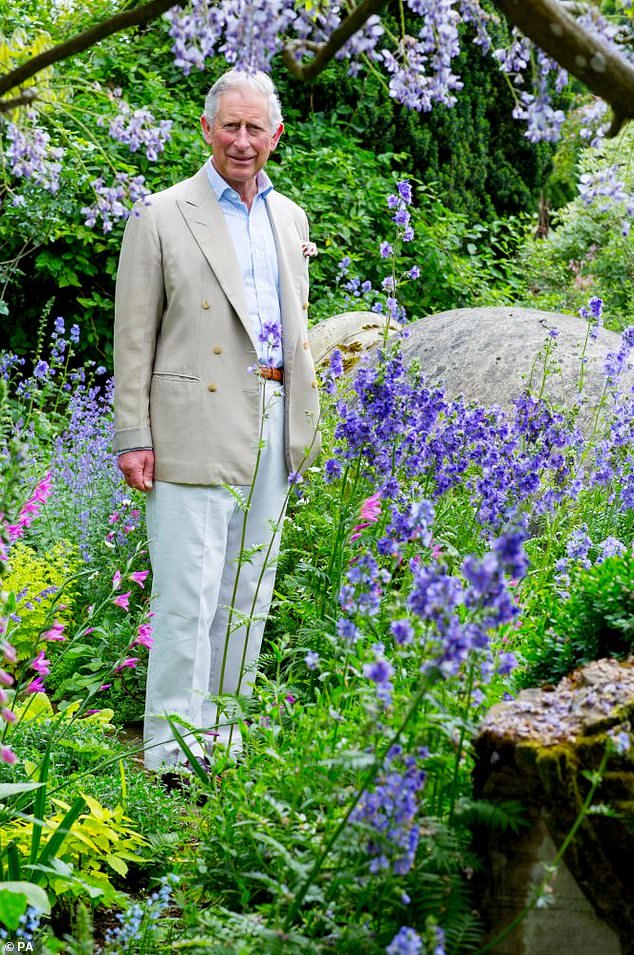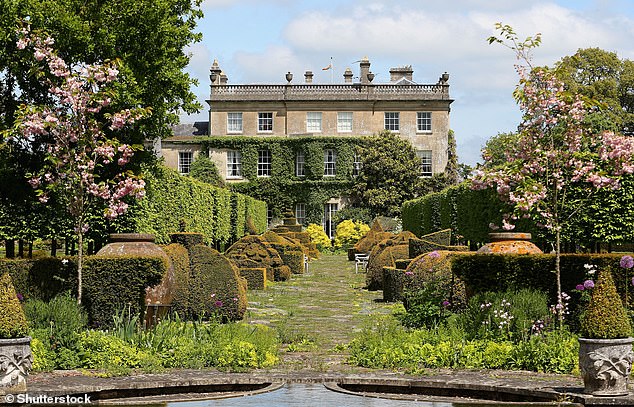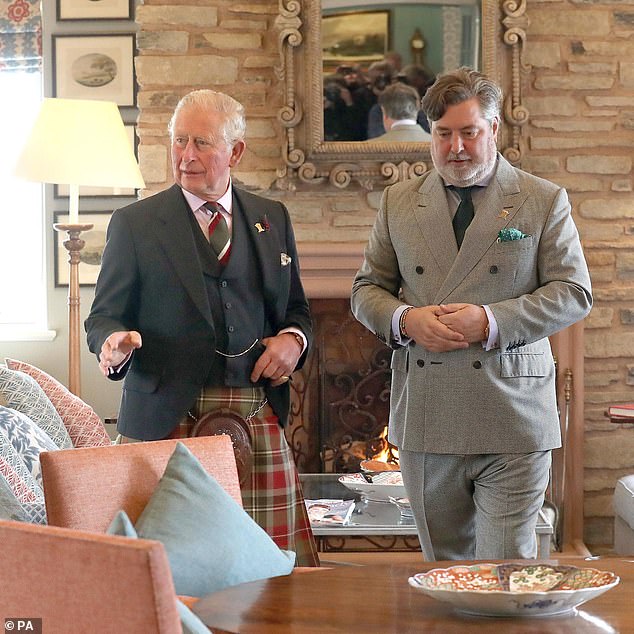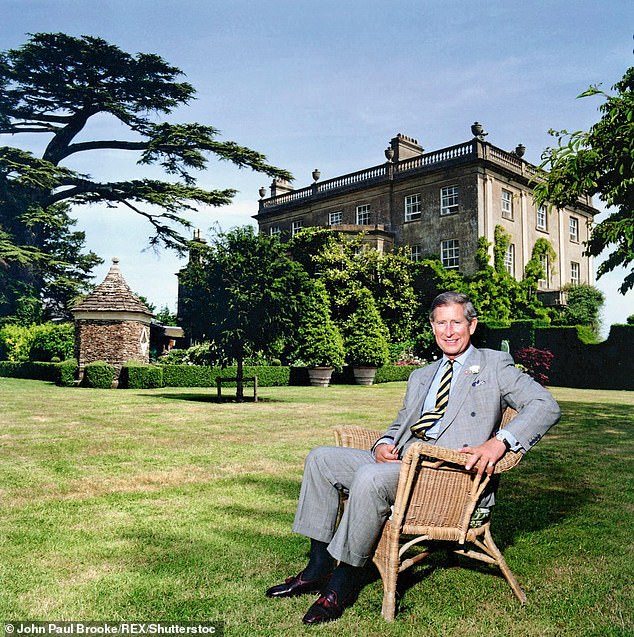His funeral wreath of white roses was alone on top of the coffin. But it was the accompanying words that summed up the then Prince of Wales’s enduring devotion.
‘For dearest Paddy,’ the prince wrote, ‘the finest and most loyal of old friends that anyone could hope for.’ Signing off, he added: ‘With affectionate and grateful remembrance, from Charles.’
Such startling terms of endearment from the prince to his closest friends were not unique, but Paddy Whiteland was hardly a typical royal confidant.
A tough, straight-talking, Liverpool-born Irishman and survivor of a Japanese prisoner of war camp, he was the only member of the Highgrove staff the prince kept on after purchasing the Gloucestershire home that has now been his refuge for 45 years.
In his best-selling book, Highgrove: Portrait Of An Estate, the prince declared: ‘Everything I have done at Highgrove could not have been achieved without Paddy. I am forever indebted to him.’
Their relationship was much deeper than that of master and servant, not least because the genial gardener had worked on the estate since 1948, the year of Charles’s birth. He knew every blade of grass and what lay beneath every upturned stone, and it was with Paddy at his side that Charles transformed the gardens and grounds.
So deep was this affection, I can reveal, that Charles commissioned a bust of Paddy – complete with glowing inscription – which sits to this day on his ‘wall of worthies’, where likenesses of many of the influential people in the King’s life have been assembled into a screen.
Fast forward 28 years after Whiteland’s death, and the relationship between King Charles and his Highgrove gardening staff is said to be far from rosy.
It is claimed there has been an exodus of gardeners amid complaints about staff shortages, low pay and the monarch’s overly demanding expectations.

The King in his prized garden at Highgrove, Gloucestershire

The relationship between Charles and his Highgrove gardening staff is said to be far from rosy
A place once renowned for its solace and tranquillity is now said to be a source of upheaval and disharmony, at least according to The Sunday Times, which last weekend reported that over the past three years, 11 of the 12-strong gardening team managing the 15-acre garden had quit, including a head gardener and his deputy.
The King, who likes to patrol the grounds with a pair of secateurs in one hand and a notebook in the other, regularly offers feedback on the garden, writing memorandums to staff in red ink, expressing delight or dismay at the progress of individual plants or flowers.
One memo was said to have demanded the removal of a single, unattractive ragwort from the perimeter of the outdoor swimming pool. Another that the failure to cultivate his beloved delphiniums had been a matter of disappointment, spoiling one of his favourite moments of the summer.
Other written notes apparently made by the King to his gardeners asked why name tags from magnolias were missing, why they had failed to save a treasured evergreen azalea and why acers had been left in a poor state, it is claimed.
The newspaper also reported that the King said of one gardener who lacked knowledge about a particular flower: ‘Don’t put that man in front of me again.’
While some workers were said to value these royal interventions, others found his feedback impolite and demoralising.
Matters came to a head in late 2023 when one member of staff filed a grievance against management, protesting that the gardening team were under-resourced and struggling to fulfil the King’s demands. His complaint alleged that some colleagues had injured themselves in their attempts to keep up with the King’s requests and that morale was low among the team. After an investigation, managers were told to offer mental health support and counselling.
All in all, it seemed a far cry from the bucolic days when Charles and Paddy Whiteland began to oversee the princely vision for the gardens. In the decades since, realising this dream has not only consumed a significant amount of Charles’s time but vast sums of money. So, what on earth has gone wrong?
The story of Highgrove and the cultivation of some unremarkable parkland and pastures into an envious paradise of remarkable beauty and colour is not just woven deeply into Charles’s psyche, but is a huge part of his life.
It’s where he took his young bride-to-be, Lady Diana Spencer, a few months after purchasing the estate from publishing heir Viscount Macmillan, son of former Prime Minister Harold Macmillan. It was where he built a treehouse for their sons William and Harry, who – hidden from view – would fire rubber-tipped bows and arrows on unsuspecting guests below.
When the royal marriage went south, Highgrove became Charles’s sanctuary. His mistress, now Queen Camilla, became its chatelaine. It was where he spent the Covid-19 lockdown and where he learnt of the death of his father, Prince Philip.
With neither of his sons showing any enthusiasm to inherit the house and grounds, Charles took steps to secure its future after his elevation to King. If he had done nothing, Highgrove, which had been bought via the Duchy of Cornwall, would have automatically transferred to William as Prince of Wales and triggered uncertainty over its destiny.

Charles with his former valet, Michael Fawcett – who was forced out of the King’s circle in 2021

Charles, then the Prince of Wales, at Highgrove in 2002
In 2021, just a year before he succeeded Queen Elizabeth, Charles created a new company, Highgrove Nominees Ltd, in which he was the only shareholder. It struck a 20-year agreement with the Duchy to rent the estate, allowing him to keep the Grade II-listed mansion until the age of 92.
The gardens were sublet to the Prince’s Foundation – now the King’s Foundation – which oversees their day-to-day management. This arrangement would also raise funds through garden tours, rural crafts workshops and the sale of branded goods to help make Charles less reliant on gifts for his charitable projects from so-called ‘dodgy donors’. It’s proved a money-spinner, with more than 40,000 people a year visiting Highgrove, generating a £6 million turnover.
But it is since the changes were introduced that the troubles and the stories of so-called dysfunction allegedly began.
In its report, The Sunday Times said its claims were based on interviews with eight sources who have worked as royal gardeners or have ‘detailed knowledge of the estate’s inner workings’. Friends of the King, however, are frankly sceptical about some of the charges made against him.
One issue said to rankle particularly is the claim that the King had reprimanded a gardener for his lack of knowledge about a flower. According to a source with an understanding of the situation, this was not the case.
The King had been irritated because the gardener concerned asked directly for an unskilled friend of his to be hired. ‘He was not being beastly to this man,’ I’m told. ‘The fact is he was ambushed over a matter, and it was this that he was cross about.’ Then there is the ragwort removal controversy. If anything, this shows the King’s striking attention to detail. Ragwort may look attractive but it is a weed, spreads quickly and is poisonous to some animals.
According to the reports, the single offending ragwort was not in a publicly accessible part of the garden and therefore not in the remit of the gardeners. Friends disagree. As one says: ‘It is an invasive and noxious weed and hardly seems unreasonable to request its removal.’
It is fair to say that no one knows more about Highgrove’s gardens than Charles. Might, therefore, the problems stem from the fact that as monarch Charles simply does not now have time to garden? Certainly the days when, as Prince of Wales, he would base himself at Highgrove with his London office staff working out of the house so he could have more time in the garden are long gone. As King, he has inherited other properties in which he must also invest time.
In many of these royal homes, from Balmoral in Scotland to Sandringham in Norfolk, Charles has set about the gardens with the same passion he once had for Highgrove. ‘He sees the gardens as an important part of his legacy,’ a close friend says.
His ongoing cancer treatment has also had an impact. Not only does it restrict his visits to the countryside but also means he doesn’t have the energy he used to.
Of course, stories about Charles as a demanding, pernickety fusspot – together with a lavish, pampered lifestyle – are not new. Over the decades, his relentless pace led to a high turnover of senior advisers whom he exhausted with round-the-clock demands.
He would phone at all hours, oblivious to any separation between personal and professional life. One aide told me that over three years Charles was the first person he spoke to in the morning and the last person at night – and this aide was married!
As thoughts occurred to him, he would jot them down, even if in bed or during meals, and expect them to be acted upon. Princess Diana found all this activity annoying and bewildering.
But while he is a much calmer person thanks to a happier second marriage, some things haven’t changed. He can still be testy. The absence of a favourite table decoration for a dinner with friends can, says one source, ‘see him going off the deep end’.
To some who know the King well, the present difficulties with the gardening team stem from the enforced absence of the one man who made his life run smoothly – former valet and personal assistant turned charity director, Michael Fawcett. The once indispensable Fawcett was forced out of the King’s circle in 2021 over the ‘donations for honours’ scandal. And life for Charles has never been quite the same.
‘Michael would never have allowed the complaints from the gardeners to reach Charles’s ears because he would have handled them himself,’ says one old associate of Fawcett.
Even so, insiders dismiss claims that there is general unhappiness among the King’s staff. In the year 2024/5, despite the fact he employed almost 500 people, only one grievance was reported and staff turnover was less than half the national average. As for pay, they also say staff have received rises each year since 2022 totalling, cumulatively, between 15 and 19 per cent.
Privately, friends of the King point to disgruntled former employees out to make trouble. Few of the gardeners I contacted were willing to comment on the issue, but Jack Stooks, a former senior gardener at Highgrove, said he thought the criticism of Charles was ‘unfair’.
He told me: ‘The world of gardening is known for its low pay, and I myself ended up leaving Highgrove after 20 years. I had a back operation and, for want of a better word, did experience getting burnt out as a result, as you would doing certain jobs regularly. Things had changed. The [King’s] Foundation took the garden on so it was the right time for me to leave. I never had an issue with the King or with his family, they are all amazingly wonderful people.
‘I don’t think this should be aimed quite at him. He’s employed the Foundation and, yes, he’s part of the Foundation, but they are running the garden. If there are problems, the King can now fix these and I’m sure he’ll be doing that now as we speak.’
All the same, it seems unlikely that Charles will be commissioning busts of any gardeners for the time being.












